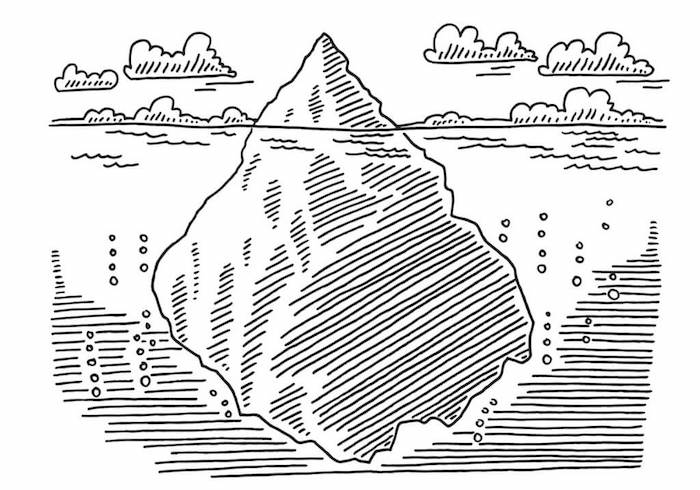I wrote an earlier version of this post about oppression as trauma in 2019 and revised it in 2020. That’s when I added the resources for learning more at the bottom. It’s important to keep learning as well as acting for growth and change.
Often, trauma is described as an iceberg, meaning the signs we see in individuals that result from adverse experiences are the tip of that iceberg. Causes of those symptoms are underneath and not always apparent. Such deeper influences include traumatic personal events and the complex neurobiological effects they cause, but it must go deeper to address harm at the systems level.
Educators may not well understand the causes or effects of trauma. As a result, becoming trauma-informed often focuses on improving understanding of what trauma is and how it impacts youth. Faculty consider how child abuse, neglect, violence, natural disasters, and poverty may potentially influence youth stress responses, child development, and school success. From there, personnel learn how to respond to already traumatized students to improve health and learning outcomes. Without a doubt, this is absolutely necessary work when building trauma-sensitive schools. This approach, however, is incomplete and harmful by itself.
The Need to Address Social Injustice
Collectively, trauma-sensitive educators must also address historical trauma, racism, and the ongoing marginalization of any group within society. These too are traumas that happen both in and outside of school. They are rooted in abuses of power and cause oppression. While directly traumatic, these injustices also create conditions that may cause vulnerabilities for other traumas too. (Comas-Díaz, Hall, & Neville, 2019; Simmons, 2020)
Dr. Bettina Love (2020) wrote We Want to Do More than Survive. She described that racism, for example, has long influenced inequitable incarceration rates and the school-to-prison pipeline. It also results in barriers to accessing housing, health care, and quality education. In turn, these inequities create poverty and other conditions that may make exposure to other traumas like environmental pollution, health conditions, neighborhood violence, substance abuse, or child maltreatment more likely. While anyone can experience trauma, inequities certainly influence and create conditions that set some groups up for the possibility of more personal traumas than others. We, as educators, cannot be trauma-sensitive without understanding these processes as well as confronting our biases and roles in perpetuating these layers of injustice within schools.
While anyone can experience trauma, inequities certainly influence and create conditions that set some groups up for the possibility of more personal traumas than others. We, as educators, cannot be trauma-sensitive without understanding these processes as well as confronting our biases and roles in perpetuating these layers of injustice within schools.
Dune’s Story
Let’s imagine that a white, female school counselor is working with a Black high school student, Dune, who seems to struggle with emotional regulation. Perhaps, Dune seems quick to anger, which corresponds with frequent conflicts and behavioral challenges. Educators comment that he “demonstrates difficulty accepting authority.”
In using a trauma-sensitive mindset, educators move away from the paradigm of, “What’s wrong with you” to “What happened to you?” with Dune or any other student. Better yet, wonder, “What might have happened (or could be happening)?” With these questions, school personnel can begin to wonder (without being entitled to knowing) how past or current adversity could be affecting students. Educators also need to consider if the school community is ensuring both real and felt safety. This is necessary for Dune (and others) because it allows for safe, supportive, rather than punitive, approaches at school. Focusing on these points alone, however, ignores critical context. In fact, it’s dangerous.
Without a deeper, wider understanding of gender, sexual orientation, ethnicity, race, culture, identity, intersectionality, bias, racism, and injustice, the questions above by themselves risk fueling deficit ideologies (Gorski, 2019; Shalaby, 2017). The school counselor, for example, may blame Dune and his family for what’s going on, believing that Dune’s father’s incarceration is the root of Dune’s problems. From there, she may assume that Dune needs to learn to control his actions or he too will end up in prison. This is a big miss, however, and may drive the counselor to wish that she could save Dune from the traumatic situation she perceives him to be in.
Questions to Think About
Instead, educators must consider their role in students’ experiences both in and outside of school (Gorski, 2020; Shallaby, 2017; Simmons, 2020). Do this before teaching or counseling students for personal change. It means wondering, “What might have happened (or could be happening)?” But also, “What has socially contributed to this?” And, “How are school adults’ biases and patterns of behavior (as well as school policies and practices) part of the problem?”
Here are a few more questions to consider.
- What might educators be getting wrong in how they are perceiving and approaching groups, particularly with youth whose identities are different from their own (Gorski, 2019)?
- How is whiteness centered in the school, curricula, texts, and pedagogy? And, how is whiteness perpetuating assumptions (e.g., Dune’s anger as a Black male) (Simmons, 2020)?
- How is the dominant culture contributing to misunderstandings at best? Or, punitive treatment and a lack of safety and violence at worst (e.g., with discipline) (Gorski, 2019; Love, 2019)?
- Specifically, what does the data show about the relationships between student identity characteristics and law enforcement intervention as well as access to special education, advanced placement courses, and extracurricular activities (Gorski, 2019)?
- What are some of the very real reasons rooted in injustice that students, like Dune, may be angry (Love, 2019; Shallaby, 2017)?
- What, if anything, might Dune wish to contribute about his life narrative?
- Finally, what’s the plan for dismantling the inequities that are impacting students, including Dune (Gorski, 2019)?
These questions go deeper and wider into the social influences that contribute to the iceberg of trauma. Only through this ongoing work can educators appreciate how each student’s experiences, protective factors, and strengths influence their life and learning.
Brene´ Brown on “Getting it Right”
I wish that I would have gone deeper into these truths in the first edition of Building Trauma-Sensitive Schools. As Dr. Brene’ Brown explained on Twitter on August 4, 2019, in response to Christina Torres as well as work with Kelly Wickham Hurst (in addition to others I may have missed), “We don’t need to be right–we need to get it right.”
I promise to keep reflecting, listening, learning, changing, and fighting for change so that I can continue to be part of a collective “getting it right.” Especially as a white woman from Iowa, please know that I want you to call me out or in if I’m ever contributing to harm in my actions or misunderstandings. I still have a lot to learn, and I promise to keep at it.
Importantly, there are BIPOC who have been and continue to be leading this fight for change. I’m here to listen and join them. To learn more about who I’ve been learning from, check out the suggestions for learning more below as well as the references.
To Learn More…
- Read Paul Gorski’s (2020) piece called How trauma-informed are we, really? in Educational Leadership, 78(2), 14-19.
- Read Cierra Kaler-Jones’ (2020) writing for Communities for Just Schools Fund entitled When SEL is used as another form of policing.
- Learn from #ClearTheAir as well as #LiberateAndChill. Both communities and the educators who facilitate them have much experience when it comes to learning and leading for equity and social justice through anti-bias anti-racist (ABAR) work. Consider following them on Twitter and join their discussions online. I have learned a great deal from them and the authors they highlight. I know that you will too.
- Join Eriece Colbert, an experienced classroom teacher, instructional coach, and adjunct professor who is a racial and social advocate, and for our class Understanding and Addressing Racial Trauma. Schedule a free consult to learn more.
In conclusion, trauma-sensitive educators must be concerned with all layers under the tip of the trauma iceberg. It requires going deep down to examine our own roles in social problems. And, it means joining others who are fighting injustice in all its forms–while encouraging youth how to do that too. Change worth enacting will be messy and demand taking a long, hard look at ourselves, especially as white educators, so that schools can meet the needs of all students. Every. Single. One.
Fighting for change,

#BuildingTraumaSensitiveSchools #FeelSafe #BeConnected #GetRegulated #Learn #Liberate
References
Brown, B. (2019, August 4). This feedback has made us so much better [Tweet]. Retrieved from https://twitter.com/BreneBrown/status/1158124353994874883
Comas-Díaz, L., Hall, G. N., & Neville, H. A. (2019). Racial trauma: Theory, research, and healing: Introduction to the special issue. American Psychologist, 74(1), 1-5. http://dx.doi.org/10.1037/amp0000442
Gorski, P. (2019) Avoiding racial equity detours. Educational Leadership. Retrieved from http://www.edchange.org/publications/Avoiding-Racial-Equity-Detours-Gorski.pdf
Love, B. (2019). We want to do more than survive: Abolitionist teaching and the pursuit of educational freedom. Boston, MA: Beacon Press.
Shallaby, C. (2017). Troublemakers: Lessons in freedom from young children at school. New York, NY: The New Press.
Simmons, D. (2020). If we aren’t addressing racism, we aren’t addressing trauma. ASCD Inservice Blog. Retrieved from https://inservice.ascd.org/if-we-arent-addressing-racism-we-arent-addressing-trauma/



